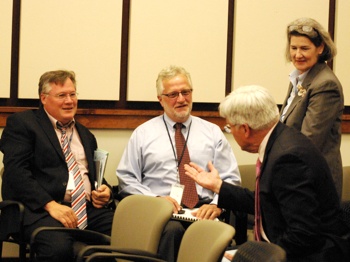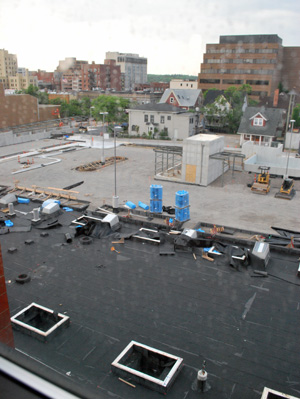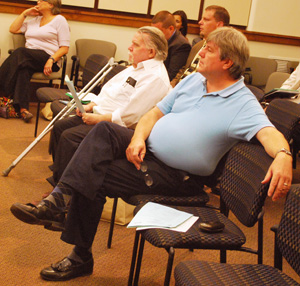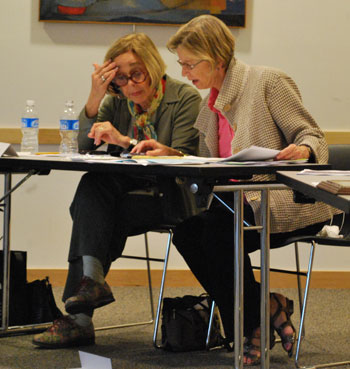Washtenaw County board of commissioners meeting (May 15, 2013): A presentation that county commissioners called “daunting” and “sobering” was among several budget-related items on the May 15 agenda.
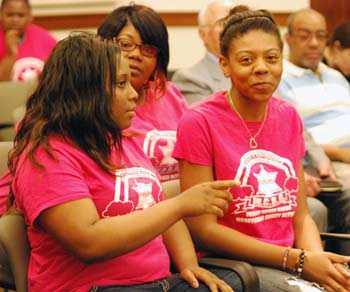
From left: Princess Logan and Monique Franklin, students at Ypsilanti High School, are part of the Young Women Making Washtenaw Better program. Seated behind them is Natalia Harris, community outreach coordinator for the Washtenaw County sheriff’s office, which sponsors YWMWB. (Photos by the writer.)
In her state-of-the-county address, county administrator Verna McDaniel set a goal of identifying $6.99 million in structural reductions for the 2014 budget. The approach to addressing this $6.99 million target depends on whether the county moves ahead with a major bond proposal, which would cover the county’s pension and retiree healthcare obligations. [See Chronicle coverage: "County Board Debates $345M Bond Proposal."]
If the board decides not to bond for those obligations, McDaniel said that most of the $6.99 million would need to come from a reduction in operating costs, as well as $100,000 in cuts to outside agency funding. Finding the $6.99 million in cuts would be very challenging, she added, given the amount of reductions that have already occurred in the past few years. Serviceability levels and major programs would be affected.
Action related to the bonding proposal – for up to $345 million, the largest ever issued by the county – was originally on the May 15 agenda. But early in the meeting, board chair Yousef Rabhi announced a decision to push back the process until the board’s July 10 meeting. He cited the need for more time for public input and additional information – including updated actuarial reports that are due in late June. Public hearings on the proposal are set for June 5 and July 10, with a board working session on the issue scheduled for June 6.
The board also voted to hold a special meeting on July 24, to allow for additional bond-related votes and public commentary, if needed. Rabhi also announced a series of informal meetings at coffee shops in Ann Arbor to discuss the bond proposal with residents. The first “Bonding Over Coffee” will be held on Tuesday, May 28 from 4-6 p.m. in the basement of Elixir Vitae (formerly Café Ambrosia) at 326 Maynard St. in Ann Arbor.
Among the several items that the board is expected to vote on at its July 10 meeting is a “notice of intent” to issue the bonds. This is a standard initial step in the bonding process, letting residents know that they have 45 days during which they can circulate petitions to require a vote of the people before any bonds are issued. Ronnie Peterson reminded commissioners that just a few years ago, a citizens group had gathered enough signatures to force another bond proposal – for expansion of the county jail – onto the ballot, where it was defeated by voters. For the current bond proposal, about 15,000 signatures would be required to force a voter referendum.
In another budget-related item on the May 15 agenda, the board received a first-quarter 2013 briefing. The county’s financial staff is now projecting a $818,999 shortfall for the year – the difference between $102,364,815 in projected general fund revenues and $103,183,814 in projected expenditures. That shortfall is lower than the $3.03 million shortfall that was originally projected for 2013.
The board continued its budget discussion at a retreat on May 16, where they worked to hone priorities for the next four years. This Chronicle report includes a summary of that two-hour session.
In other May 15 action, the board gave initial approval to set the 2013 county general operating millage rate at 4.5493 mills – unchanged from the current rate. Several other county millages are levied separately: emergency communications (0.2000 mills), the Huron Clinton Metroparks Authority (0.2146 mills), two for county parks and recreation (0.2353 mills and 0.2367 mills) and for the natural areas preservation program (0.2409 mills). That brings the total county millage rate to 5.6768 mills, a rate that’s also unchanged from 2012. A final vote and public hearing is expected on June 5.
The board also passed a resolution expressing support for the state of Michigan to expand the federal Medicaid program, as part of the Affordable Care Act – a measure currently being debated in the state legislature. During deliberations, Dan Smith (R-District 2) voiced his objection to the county weighing in on state issues, but he left the room prior to the vote.
A range of other issues were raised as items of communication by commissioners or during public commentary. Topics included: (1) a corridor improvement authority planned by Pittsfield Township for a section of State Street; and (2) the possibility of renewing the county’s membership in the Michigan Association of Counties. [Full Story]




